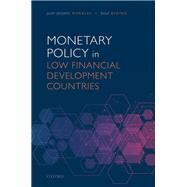- ISBN: 9780198854715 | 0198854714
- Cover: Hardcover
- Copyright: 10/25/2021
Monetary Policy in Low Financial Development Countries provides a broad coverage of the monetary policy issues faced by developing countries with low financial depth. These low and lower middle income countries are characterized by the predominance of bank finance, shallow financial markets, low financial inclusion, weak integration with world capital markets, and a high degree of informality in economic activity. Monetary policy acquires special twists, making it different in many aspects from the policies followed in advanced and emerging market economies. This book covers the main facets of monetary policy making, using an approach that combines discussions of theoretical arguments, of results from empirical studies and of relevant policy experiences. It presents the monetary policy instruments that central banks rely on in these countries. It assesses the specificities of their monetary transmission mechanism, i.e. the way central banks' actions affect output and prices. It evaluates the advantages, drawbacks, and challenges of the different nominal anchors they may choose from: exchange rate targeting, monetary targeting, and inflation targeting. This discussion is set against the background of the three main goals pursued by central banks: price, output, and financial stability. Particular attention is devoted to the issue of the credibility of central banks and to the trade-offs they face when external shocks, to which these countries are very vulnerable, lead to conflicts among the three goals they pursue. The authors also cover more specific topics, such as the coordination between monetary and fiscal policy, the challenges raised by dollarization, the implications of informal labour markets and of microfinance institutions for monetary policy-making, as well as the role of models for forecasting and policy evaluation by central banks.







